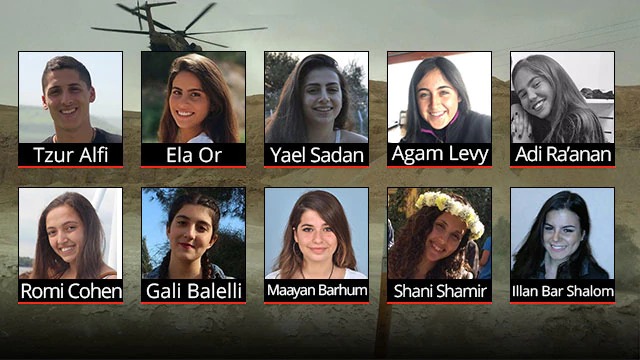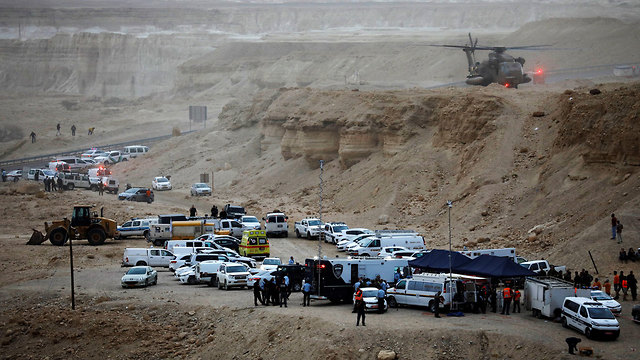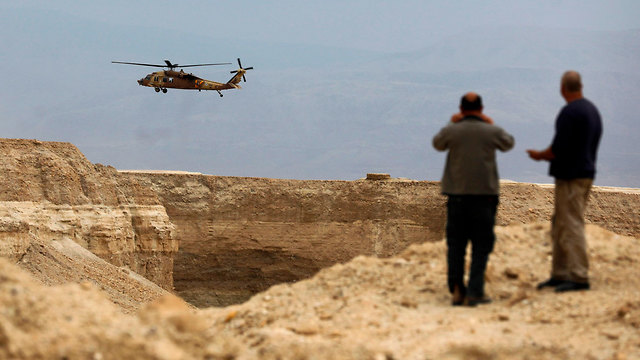

Zafit Stream disaster: Pre-military academy's principal, instructor placed under house arrest
Police investigating death of 10 teens in flash floods decide to change instructor Aviv Bardichev's suspected offense to manslaughter, while academy principal Yuval Kahan is still suspected of negligent homicide; heads of several pre-military academies voice concerns disaster will paralyze academies' independent decision-making ability, while others say disaster requires 'a thorough self-examination.'
The police on Monday placed the principal of the Bnei Zion pre-military academy, Yuval Kahan, under a five-day house arrest following last week's Zafit Stream flash flood disaster, which left 10 teenagers dead. Instructor Aviv Bardichev, who took part in planning the fatal trip, was placed under house arrest as well.
Police Investigators decided to change Bardichev's suspected offense to manslaughter instead of negligent homicide whereas Kahan is still suspected of negligent homicide.
Kahan and Bardichev were forbidden to enter the Bnei Zion association's offices and contact anyone related to the investigation for 10 days.
Manslaughter attributes the results of an offense to indifference or recklessness, while in negligent homicide cases the suspect is believed to not have been able to foresee the outcome.
Instructor Bardichev, who is represented by Attorney Zion Amir, is suspected of deciding to go on the hike despite stormy weather warnings.
The Zafit Stream disaster sent shock waves through the pre-military academy schools. On the one hand, the academies' managers are concerned about losing their independent decision-making ability which will make the year spent in the academies similar to another regular school year with restraining regulations.
On the other hand, many instructors are now asking basic questions that show how bewildered they are, according to sources that spoke with the instructors.
The Joint Council of the Pre-Military Academies released a documented protocol in 2016 meant for students and instructors that entails a specified chapter about fieldtrips. Unfortunately, the academies' principal used it as a recommendation only.
Following the disaster that took the lives of 10 students, the council appointed former Police Commissioner Shlomo Aharonishky as a safety and fieldtrip security external advisor.
The Joint Council will hold a meeting with all the pre-military academies schools' heads on Wednesday in Beit Berl.
Yoni Konforti, who until recently has been in charge of the Neveh Tzuf's pre-military academy school and today serves as an advisor to several academies, wrote on social media that a year and a half ago he had asked the Ministry of Defense and Ministry of Education to include the pre-military academies under the safety rules binding every educational institution in Israel.
"I insisted on legislation on the matter before tragedy strikes, unfortunately, nobody listened," he said.
Several pre-military academy principals say they are free to act as they see fit on the matter of fieldtrips. According to Rabbi Eliav HaCohen, who heads the Pre-military Orot Academy, every academy formulates its own protocols.
HaCohen said that his academy uses a SUV with a paramedic and an armed escort as a safety measure during fieldtrips. "It costs a lot of money, but it's for the best interests of keeping the students safe," he said.
HaCohen told that a few months ago he had to cancel a trip amid route works, and that two weeks ago he canceled a trip to Menashe Heights due to stormy weather.
The head of another pre-military school academy also said strict preparations are made prior to each trip. "We have a person in charge of the fieldtrips. We meet before every activity done outside the school and go through it thoroughly."
The heads of the academies hope that the flash flood disaster in the south where 10 teens lost their life won't be subjected to restricting rules and regulation which would prevent the academies from fulfilling their goals.
Amihai Noam, head of research in the Kfar Etzion Field School and an experienced instructor, described the matter as an unregulated domain.
"Many pre-military academies contact me for consultation before going on trips, they call since they know me, but my recommendations have no legal power," Noam told Ynet.
"Sometimes they ask basic questions about the quantity of water required for a certain trip—where should they spend the night and if they can hike when flood warnings are present. That show how lost they are and their lack of seriousness," he went on to say. "Unfortunately many instructors don't even call to consult.
"The Ministry of Education refuses to give information and instruct people that don't represent known establishment in the education system. I think we should create a national call center that will provide private hikers and especially non-formal education establishments with answers."
"The pre-military academies are only the tip of the iceberg," Noam warned. The yeshivot also have nobody to consult with and their lack of knowledge in hiking and lack of access to information are even bigger.
Families going out to hike have the same problem," he lamented.
"The solution lies in the establishment of a public body that would be able to guide and assist, and by doing so, will definitely save lives," Noam concluded.
Another pre-military academy head said the Zafit Stream disaster "clearly requires a thorough self examination on a national level as well on a local level in every academy." Unfortunately we had to experience this disaster to understand a change has got to be made," he said.
Ilana Curiel, Roi Rubinstein, Kobi Nachshoni and Adir Yanko contributed to this report.



















